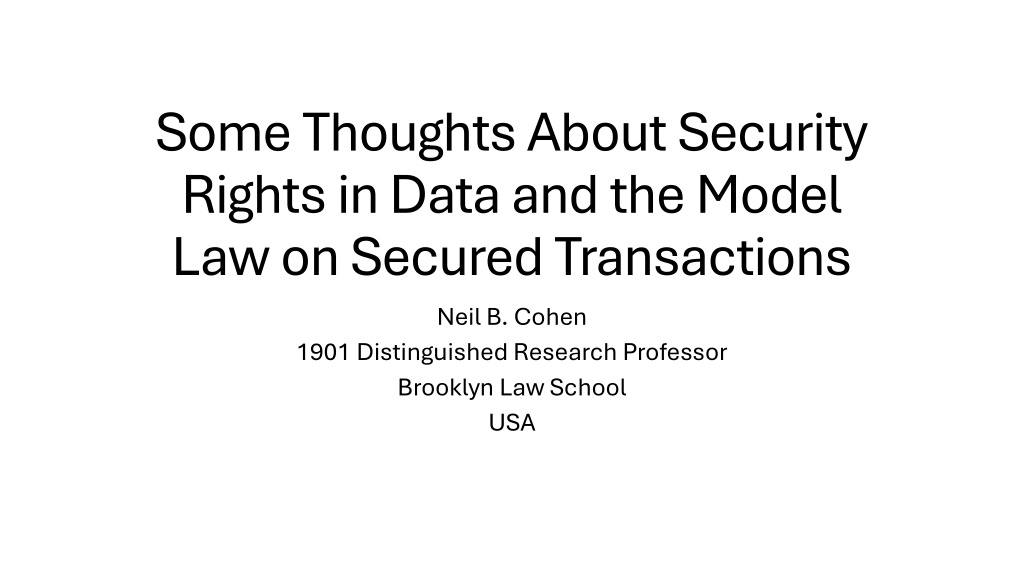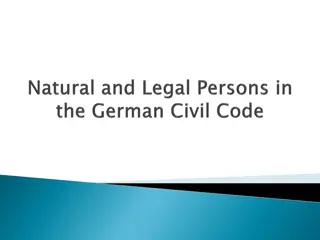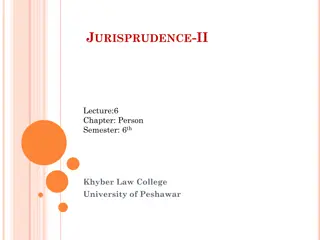
Security Rights in Data and Model Law on Secured Transactions
Explore the economic case for security rights in data, definitions of data, and the adequacy of the UNCITRAL Model Law for governing data as collateral. Dive into the complexities of data as assets and collateral, and considerations for third-party effectiveness in securing interests in data.
Download Presentation

Please find below an Image/Link to download the presentation.
The content on the website is provided AS IS for your information and personal use only. It may not be sold, licensed, or shared on other websites without obtaining consent from the author. Download presentation by click this link. If you encounter any issues during the download, it is possible that the publisher has removed the file from their server.
E N D
Presentation Transcript
Some Thoughts About Security Rights inData andthe Model Law on Secured Transactions Neil B. Cohen 1901 Distinguished Research Professor Brooklyn Law School USA
The EconomicCase for Security Rights in Data Data has enormous value Even though standards for valuation of data are still evolving Business valuation Accountingvaluation Using that value to increase access to credit is a key function of a secured finance. The key to the effectiveness of secured credit is that it allows businesses to use the value inherent in their assets as a means of reducing the creditor s risk that it will not be paid. UNCITRAL Legislative Guide on Secured Transactions.
What Do We Mean By Data? ALI-ELI Principles for a Data Economy: Data Transactions and Data Rights (2022): Data means informationrecorded in any machine-readable format suitable for automated processing, stored in any medium or as it is being transmitted. Working definition of UNCITRAL WG IV: Data means a representation of information in electronic form or other form suitable for processing in an information system. Is the difference important? ALI-ELI Principles define copy as any physical manifestation of data in any form or medium.
Is the UNCITRAL Model Law Sufficient to Govern the Use of Data as Collateral? The Matter of Scope. The Model Law states that that it applies to security rights in movable assets. What is an asset ? Must data be property in order to be an asset? Is data property, especially when not protected by IP law? ALI-ELI Principles: These Principles do not address whether rights in data are to be characterized as ownership or property (except, of course, when other law, such as intellectual property law or the like, affirmatively creates property rights). What about sui generis database rights? Security rights are property rights. Can there be a property right in an asset that is not itself property?
What is the Collateral? Is the collateral the information? Even if not protected by IP law or the like? Is the collateral the representation? Is that the medium? Unlikely, since information is non-rivalrous. Is the collateral akin to a trade secret? WIPO defines trade secret as information that is (i) commercially valuable because it is secret, (ii) known only to a limited group of persons, and (iii) subject to reasonable steps taken by the rightful holder of the information to keep it secret, including the use of confidentiality agreements for business partners and employees.
Third-Party Effectiveness What steps should be required/allowed in order to make a security interest in data effective against third parties? Registration of a notice? (How to describe the collateral?) Possession of medium/server? Control? (Of what?) Should control also have super-priority?
Enforcement How can a security right in data be enforced (and against whom)? How to enforce if the grantor has possession of the medium? Is transmitting the data sufficient? Must the grantor erase the data after transmission? (After all, data is non-rivalrous.) How to enforce if the data is stored in the cloud in servers maintained by a third-party cloud services provider?
Enforcement What does the transferee on disposition get? The medium? The informational content? The exclusive right to the informational content? Can the grantor continue to use the information after enforcement? Must it forget the information? Is the transferee of data subject to contractual limitations on its use? Is the transferee subject to legal restrictions on its use (such as those emanating from data privacy law)?
Choice-of-Law Rules Which state s law should govern creation of the security right? Which state s law should govern third-party effectiveness of the security right? Which state s law should govern enforcement of the security right? Obtaining the data Disposing of the data Application of proceeds of disposition Effect on third parties
More Thought Needed? Do these questions need to be addressed in order to have a well- functioning economic regime of credit extended against data? Can some of the questions be resolved by private ordering (i.e., by contract between the relevant parties)? Can some concerns be addressed/explained by additional commentary to the Model Law? Would addressing some concerns require amendment to, or augmentation of, the Model Law?






















